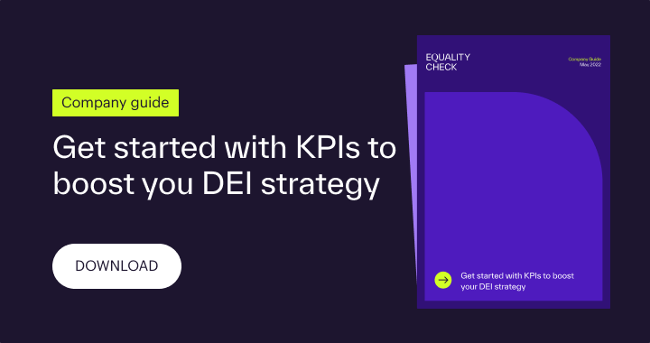Increasingly around the globe we’re seeing a rise in various types of reporting obligations in relation to workplace diversity, equity, and inclusion (DEI). The global list is far too long to include here, but some quick examples include:
- In Norway, the activity and reporting obligation ("ARP") where private companies with 50+ employees (20+ employees for public organisations) are obligated to submit a public report annually, including (but not limited to) survey data analysing gender balance and gender salary gaps within the company.
- In Australia the Workplace Gender Equality Agency Act 2021 requires private sector employers with 100 or more employees to file an annual report with the government, signed by the CEO
- In the UK, under the Equality Act 2010 (Gender Pay Gap Information) Regulations 2017 (GPG Regulations), requires some employers to publish an annual report containing data on their gender pay gap
- Also in the UK, the Financial Conduct Authority (FCA) introduced new reporting obligations in April 2022 requiring publicly listed companies to report on diversity and inclusion on company boards and executive management
But alongside a climate of growing discourse about business and its ability to provide social value, not just pure economic value, regulatory compliance can feel like another operations headache for companies and their boards.
But while it is easy to understand why companies feel the friction, for companies that genuinely want to succeed with DEI, they really should view compliance as a big opportunity.
There are several reasons for this, but just before we get to those, there’s one thing that’s really helpful to keep in mind when it comes to DEI and compliance: the intention of whoever created the reporting obligations relevant to you is almost always to help companies onto the right path, not catch them out, or publicly highlight wrongdoing.
Compliance reporting gives a great framework that tells companies where to start
Many organisations tell us stories of how they struggle to know where to start with DEI strategy. They struggle with what insights they need, and where to find those insights. Compliance helps address this problem very effectively:
- Regulatory reporting standards have clear structures with specific criteria of what is to be included
- Compliance reporting emphasises the need for proof and evidence-based approaches.
- With a lack of data or clear insight, companies will often rely on a mix of hard to measure communications or activities, or measure using the wrong data simply because it’s what they have, not because they know it to be the right data
- This encourages you to think systematically in terms of proven, measurable effectiveness, not only activity.
- Meeting reporting obligations therefore, by their very nature help to develop the right strategic thinking so it’s then much easier to adopt an evidence-based approach for your overall corporate strategy
It’s a great way to build internal processes and competencies for DEI
As mentioned above, many companies struggle with where to start with DEI. This is often strongly linked to feeling they don’t have the right knowledge or processes to create a robust strategy internally.
This covers domain expertise (the ability to identify a useful starting point, what areas and insights do we need to examine and analyse), as well as building up reporting competencies that help demonstrate results (developing workflows and business processes to efficiently translate expert understanding into clear, valuable outputs for relevant stakeholders).
Compliance helps address this problem very effectively:
- Regulatory reporting standards have clear structures with specific criteria of what is to be included
- Compliance reporting emphasises the need for proof and evidence-based approaches.
- With a lack of data or clear insight, companies will often rely on a mix of hard to measure communications or activities, or measure using the wrong data simply because it’s what they have, not because they know it to be the right data
- It encourages you to think systematically in terms of proven, measurable effectiveness, not only activity.
- Meeting reporting obligations therefore, by their very nature help to develop the right strategic thinking so it’s then much easier to adopt an evidence-based approach for your overall corporate strategy
This is not to imply that regulatory reporting doesn’t take some time to work on and understand. But by being given a clear, identifiable place to start, it’s a great opportunity to take the same underlying principles and apply them at the same time to building a holistic DEI strategy.
Work smarter, not harder
You should also benefit from an operations perspective, not just a strategic one. Doing compliance and strategy when it comes to DEI doesn’t have to mean twice the work:
- Strategic data will usually involve more in-depth data parameters than compliance, however, the reporting structure will follow the same principles.
- This means that once you’re set up to do compliance reporting, you’re very close to being ready for strategic reporting. You need to add some additional data sets, not build a whole reporting framework from scratch,
- Ongoing strategic reporting can be used to shorten compliance reporting cycles by providing clear, easy to find results and analysis at your fingertips to simply reuse in your report
With Equality Check’s Compliance tool for Norwegian companies, you can automatically export your ARP reporting structure and existing data sets directly in our Diagnostics tool so it’s super easy to get started with DEI strategic reporting.
Going beyond compliance
Of course, regulation is not meant to work in place of an overall corporate strategy, but serve as an effective way to show organisations what the minimum is they need to implement in order to create positive change.
Beyond regulatory reporting, evidence of DEI performance and progress is being considered by more and more stakeholders, from the rise of ESG reporting to cultural due diligence for investors, to vendor selection when potential customers evaluate your company, or job applicants assessing whether you’re a company whose values match up to their own.
The fact is, at a minimum, companies need to be compliant. But what company wants to aspire to a culture where doing the minimum is what’s required? As we move into a future where DEI isn’t just a “nice to have”, but a “need to have” aspect of your corporate governance and strategy, there is no better time to act with purpose and transparency.


